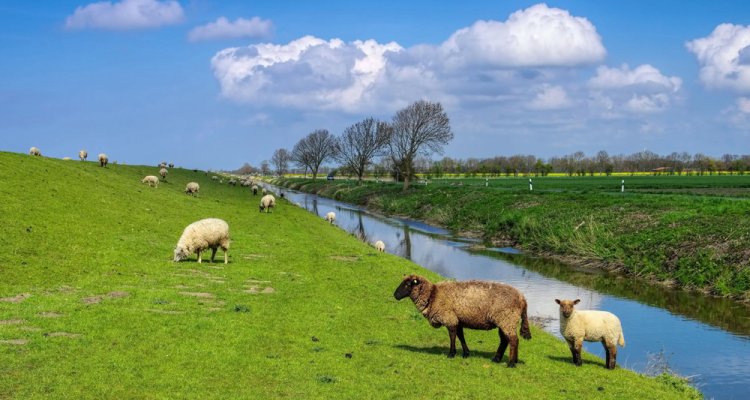
Persbericht
Wageningen Climate Solutions: we need resilient productions systems
Solutions for the climate issue and greenhouse gas emission reductions should contain climate smart agriculture, climate resilient soils and forest conservation in a trans-disciplinary approach. This is the heart of the ‘Wageningen Climate Solutions’ to meet future food and bio-based demands like energy, materials and chemicals. The required higher production levels need to be accompanied by greenhouse gas emission reductions. Wageningen University & Research centre therefore appeals to governments, business and colleague researchers to co-invest in transdisciplinary and collaborative projects for a climate smart future with local tailor-made climate solutions.
Climate Smart Agriculture
On the one hand, agricultural production suffers from the consequences of climate change through flooding, drought, salinization, extreme temperatures or pests and diseases. For example, the last IPCC report shows that high temperatures stop the grain filling period and strongly reduce productivity. On the other hand, agriculture contributes to climate change, for example through greenhouse gas emissions from soils or livestock. Scientists from Wageningen UR think that Climate Smart Agriculture (CSA) offers system solutions that can address adaptation problems and reach emission reduction goals while production levels are raised to meet food security requirements. CSA is also economically profitable which is important for land users (i.e. farmers) to play a contributing role.
Soils
Soils have an important function in the carbon cycle. Soils contain twice as much carbon compared to the atmosphere, up to 1500 Gton. Theoretically, 5 Mton CO2 could be stored in Dutch soils through various measures, but actually only 1 Mton CO2 is achieved today. Soils are sensitive to climate change, with increased salinization, erosion due to drought or flooding. This is what makes climate change a complex problem. Measures like minimal tillage, application of crop residues, manure and compost, and crop rotation contribute to increase the carbon storage in the soil and create a more climate resilient soil. Climate resilient soils can store more water, are more productive due to a better structure and a higher soil fertility, and are therefore ecologically and economically feasible.
Forests
The global total number of trees is 3 trillion, or about 422 trees per person. However, the total number of trees has almost been halved since the start of human civilization. Ecosystems with a long lifespan, like forests, are more vulnerable to the relatively fast climate change. European forests are considered old, meaning they will convert less carbon from the atmosphere into biomass. Nevertheless, European forests still fix a considerable amount of 362 Mton CO2 per year. The United Nations collaborative initiative on Reducing Emissions from Deforestation and forest Degradation (REDD+), in which Wageningen UR is a leading institute, estimated that carbon emission rights for forests account for 30 billion US dollar.
Livestock
Growing more food without growing more greenhouse gas emissions is the mission of the Global Research Alliance on agricultural greenhouse gases, in which Wageningen UR is one of the leading parties. In the alliance 46 countries are aligned to investigate climate smart solutions. Accounting for an estimated 14,5% of global anthropogenic greenhouse gas emissions, livestock sector plays an important role in climate change. Wageningen UR leads the Livestock Research group of GRA, that identified a potential for a 40 percent reduction in livestock methane emission through integrated breeding, feeding, health and manure management.
Integral vision
Wageningen UR stresses the importance of an integral vision and a regional systems approach for sustainable development. Climate change has an overarching effect on development. The consequences of climate change vary strongly among systems and regions worldwide. Building resilient production systems, including soil management, climate smart agriculture and forestry that can deal with shocks, and seizing opportunities provided by climate change are at the core of the strategic research themes of Wageningen UR. Local adaptation to climate change also results in better use of resources and biomass, better carbon sequestration, and thus fosters mitigation as well.
Wageningen Climate Solutions
The complexity and interrelationships of all the different factors and actors demands an integral vision in which all relevant aspects are addressed. Wageningen UR holds a transdisciplinary ‘Science for Impact’ systems approach, stimulating collaboration between experts in livestock, plants, soils, water, atmosphere, economics, sociology, geo-informatics, forestry and ecology in both the terrestrial as well as the marine environment. Together with relevant stakeholders, Wageningen scientists strive for innovative climate smart solutions along the agro-food value chain, from production to consumer. The reduction in emission from dairy livestock is already described above. Another example is the Dutch bell peppers production with a 60 percent lower carbon footprint (CO2-eq.) in 2015 compared to 1990. Both successes are results of 'Wageningen Climate Solutions’.